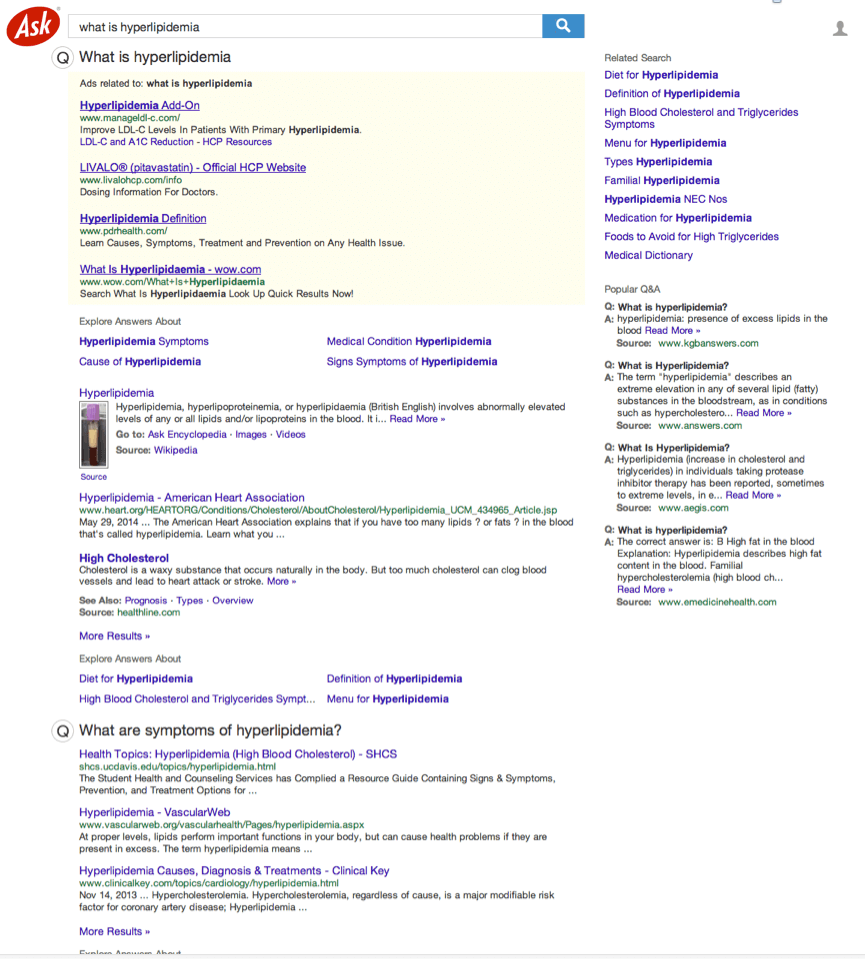In His Own Words: Ask.com CEO Responds To Arbitrage Accusations
Ask’s Doug Leeds also says the site's not collecting first-party data or double-serving ads on Google.
Ask.com CEO Doug Leeds contacted Search Engine Land with objections after a column critical of his company and sister site About.com was published earlier this week. Leeds requested a chance to respond, and what follows is his contribution.
Earlier this week, Search Engine Land published a column from contributor Susan Waldes, an executive at Five Mill Marketing, that was replete with inaccuracies about Ask.com, our parent company IAC, and our overall business.
The piece itself was not well-researched or even fact-checked (no one at IAC, Ask.com or About.com was contacted for comment or clarification), and its premise rests on a series of ill-informed assumptions and factual inaccuracies.
[Editor’s note: Contributed columns are published as opinion pieces, rather than as news articles, and we don’t require columnists to seek comment from the subjects they write about.]
Typically, I don’t attempt to personally respond to every inaccurate article. But this one was so egregiously irresponsible, I had to take action, especially given it was provided such a visible and credible platform.
Here are the biggest issues I’d like to address:
Ask.com Is Not Collecting & Profiting From First-Party Data To Power Conversant Media’s Ad Network
Waldes’ claim that Ask.com and About.com parent company IAC “owns the recently launched Conversant Media” and is collecting and profiting from first party data is false. IAC does not own Conversant Media (formerly known as ValueClick).
In January 2014, IAC purchased website assets from ValueClick, the predecessor company to Conversant Media. Those assets included financial website Investopedia and one of the leading European shopping engines, PriceRunner. But an ad network was not a part of that transaction. (Conversant Media is an independent, publicly-traded company that recently announced it is being acquired by Alliance Data.)
In any event, we did not acquire, nor do we operate, any business “collecting first party search behavior as a signal that powers [an] ad network,” as Waldes speculated. In addition, we do not currently, nor do we have any plans to, supply any third party with our users’ search data.
Ask.com And About.com Are Not Double-Serving Ads
Waldes claims Ask.com is “double-serving” ads in violation of Google’s policy because Ask.com and About.com are both owned by IAC. Double-serving refers to running two simultaneous ad campaigns for the same product.
[Editor’s note: Google’s policy on double serving says the company “generally discourage[s] advertisers from running ads for the same or similar businesses across multiple accounts triggered by the same or similar keywords. This policy, known as “double serving,” prevents multiple ads from the same or commonly-owned company from appearing on the same search results page…. Advertisers should avoid running ads from different accounts on the same or similar keywords that point to the same or similar websites.”]
We do not double-serve ads and there is no credible argument for saying we do.
To support her claim, Waldes uses the illustration of a Google results page that displays ads from both Ask.com and About.com. She goes on to say that the Ask.com and About.com landing pages (neither of which she included in the story) “are almost identical except for the site logo.” I’ve included the landing pages below for reference so you can judge for yourself.
As you would expect, every link on About.com goes to an About.com article written by an expert in a field related to hyperlipidemia. In this case, several links point to articles from cholesterol expert and practicing pharmacist Jennifer Moll; among the facts available are that diabetes and pre-diabetes are the most common illnesses leading to acquired hyperlipidemia.
By contrast, Ask.com features its Q&A experience, which provides relevant content sourced from across the web in a question-and-answer format. Not a single piece of content across these two landing pages is the same.
Waldes’ argument is like saying that The Gap is double-serving because both it and Old Navy ran campaigns on the term “blazers” – these are two distinct brands and shopping experiences despite the retailers being owned by the same parent company.
Similarly, the scenario called out by Waldes in no way violates Google’s policies, nor any interpretation of the policy I have ever heard or come across in my nearly 20 years in the search industry.
Ask.com And About.com Are Not Made For Arbitrage
Ask.com is a Q&A service with the goal of answering the real questions people have, even when those questions are formatted as a short keyword or query. Our proprietary technology suggests these questions, then we provide information from our own network of sites, or from around the web, that can answer these questions.
About.com is a reference content publisher. The site has hundreds of experts writing on thousands of subjects producing millions of articles and helping tens of millions of people every month. The articles are high-quality, well researched, and editorially produced. About is probably the most comprehensive for-profit publisher on the web.
Let me be clear: Ask.com and About.com do not exist for the purpose of driving users to pages filled with advertising.
As Waldes rightly points out, “content as a vehicle for advertising is the very basis of what we call media.”
Much like any traditional publisher, we depend on advertisements alongside our content for revenue. But content is the focus, and our content rivals any of the other publishers available on the Google pages where we advertise (compare the proprietary articles on the About.com results page against all the other sites listed on the Google page, whether in paid or organic results).
I believe the presence of advertisements on our sites is actually less prominent or invasive than most publishers’ (for example, we don’t use interstitial ads that roadblock content like many sites do, including this one). In fact, our ads, by their nature, are almost always highly relevant to the content the user has chosen to consume.
The “shady play” the author attributes to About.com does not bear out when you actually look at the experience. Every article on the About landing page for “hyperlipidemia” is relevant to that term. And every one of these articles – all originally crafted by About.com experts – is currently in the Google index and appears somewhere in the Google algorithmic results for that term.
What advertising on Google allows About.com to do is bring those articles to the top of the search page, so they are more accessible to people looking for this content. This isn’t any different than Gap paying to have its blazers featured at the top of the page. What is different is that About is promoting content as opposed to products. Is that a good thing for a content company? We believe, unequivocally, that it is.
And that’s why we use search engine marketing – among a variety of other media – to market our content services. Buying media as a content company is not arbitrage. It is the marketing of our collective businesses – high quality articles on millions of subjects – through search engines or otherwise.
And like any company worth its salt, marketing works if customers like your product, engage with it and come back again. That is what we’re after, and that’s what drives our businesses forward.
Contributing authors are invited to create content for Search Engine Land and are chosen for their expertise and contribution to the search community. Our contributors work under the oversight of the editorial staff and contributions are checked for quality and relevance to our readers. The opinions they express are their own.
Related stories


